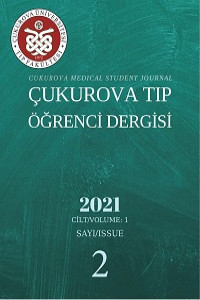Abstract
Deliryum tıbbi bir duruma bağlı veya toksik bir maruziyet
sonucu gelişen akut beyin yetmezlik tablosudur. Gün
içinde dalgalanmalarla seyreden, kişinin dikkatini sürdürme
ve odaklama yetisinde bozulmalara sebep olan bir
hastalıktır. Kısa sürede ve ani şekilde gelişen deliryum
tablosu kısaca, başta bilinç ve yönelim bozuklukları olmak
üzere dikkati toplama, sürdürmede bozukluk gibi bazı
nörokognitif bozukluklarla karakterizedir. Hastalığın
oluşmasındaki temel mekanizma asetilkolin azalışı ve
dopamin artışı olarak gösterilmektedir. Bu yazıda
deliryumun tanımı, etyolojisi, epidemiyolojisi, risk
faktörleri ve tedavi yöntemleri gözden geçirilmiştir.
References
- 1. Deliryum. https://www.etimolojiturkce.com/ kelime/delirium.
- 2. Deksnytė A, Aranauskas R, Budrys V, Kasiulevičius V, Sapoka V. Delirium: its historical evolution and current interpretation. Eur J Intern Med. 2012;23:483- 6.
- 3. Villarino Herrería H. Phrenitis in Greco-Latin medicine. Actas Luso Esp Neurol Psiquiatr Cienc Afines. 1997;25:128-34.
- 4. Wilson JE, Mart MF, Cunningham C, Shehabi Y, Girard TD, MacLullich AMJ et al. Delirium. Nat Rev Dis Primers. 2020;6:90.
- 5. Inouye SK, Westendorp RG, Saczynski JS. Delirium in elderly people. Lancet. 2014;383:911-22.
- 6. Aldemir M, Ozen S, Kara IH, Sir A, Baç B. Predisposing factors for delirium in the surgical intensive care unit. Crit Care. 2001;5:265-70.
- 7. Gleason OC. Delirium. Am Fam Physician. 2003;67:1027-34.
- 8. Wolraich ML, Hagan JF, Allan C, Chan E, Davison D, Earls M et al. Clinical practice guideline for the diagnosis, evaluation, and treatment of attentiondeficit/hyperactivity disorder in children and adolescents. Pediatrics. 2019;144:e20192528.
- 9. Setters B, Solberg LM. Delirium. Prim Care. 2017;44:541-59.
Abstract
Delirium is a manifestation of acute brain failure due to a
medical condition or toxic exposure. It is a disease that
progresses with fluctuations during the day and causes
deterioration in the ability to maintain and focus one's
attention. The picture of delirium, which develops in a
short time and suddenly, is briefly characterized by certain
neurocognitive disorders, such as disorders of
consciousness and orientation, as well as problems in
concentrating and sustaining attention. The main
mechanism in the formation of the disease is shown as a
decrease in acetylcholine and an increase in dopamine. In
this article, the definition, etiology, epidemiology, risk
factors and treatment methods of delirium are reviewed
References
- 1. Deliryum. https://www.etimolojiturkce.com/ kelime/delirium.
- 2. Deksnytė A, Aranauskas R, Budrys V, Kasiulevičius V, Sapoka V. Delirium: its historical evolution and current interpretation. Eur J Intern Med. 2012;23:483- 6.
- 3. Villarino Herrería H. Phrenitis in Greco-Latin medicine. Actas Luso Esp Neurol Psiquiatr Cienc Afines. 1997;25:128-34.
- 4. Wilson JE, Mart MF, Cunningham C, Shehabi Y, Girard TD, MacLullich AMJ et al. Delirium. Nat Rev Dis Primers. 2020;6:90.
- 5. Inouye SK, Westendorp RG, Saczynski JS. Delirium in elderly people. Lancet. 2014;383:911-22.
- 6. Aldemir M, Ozen S, Kara IH, Sir A, Baç B. Predisposing factors for delirium in the surgical intensive care unit. Crit Care. 2001;5:265-70.
- 7. Gleason OC. Delirium. Am Fam Physician. 2003;67:1027-34.
- 8. Wolraich ML, Hagan JF, Allan C, Chan E, Davison D, Earls M et al. Clinical practice guideline for the diagnosis, evaluation, and treatment of attentiondeficit/hyperactivity disorder in children and adolescents. Pediatrics. 2019;144:e20192528.
- 9. Setters B, Solberg LM. Delirium. Prim Care. 2017;44:541-59.
Details
| Primary Language | Turkish |
|---|---|
| Subjects | Clinical Sciences |
| Journal Section | Review |
| Authors | |
| Publication Date | December 30, 2021 |
| Published in Issue | Year 2021 Volume: 1 Issue: 2 |


